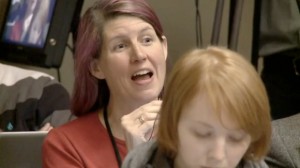
Dr. Janet Stemwedel will present at the University Scholars Series on April 20. Here, she is shown during a discussion at a Science Online conference.
Dr. Janet Stemwedel received a PhD in chemistry before she realized her true interest was in philosophy.
“A long time ago, when I was 21, I was sure I was going to be a chemist when I grew,” she said. “Then, because I realized that the questions that kept me up at night – like about how humans, with our limited sensory apparatus and our comfortable biases, can manage to build reasonably accurate knowledge about our world – were really philosophical questions, I went back to school to get a PhD in philosophy so I could focus on the philosophy of science.”
Stemwedel, the chair of the Philosophy Department in the College of Humanities and the Arts and the director of the SJSU Center for Ethics, will be presenting the final University Scholars Series lecture of the spring semester on Wednesday, April 20, from noon to 1 p.m., in MLK 255/257. She will be talking about recent research that explores the ethical dimensions of being a good scientist that extend beyond avoiding or responding to scientific misconduct.
While philosophy of science research has been traditionally focused on what scientists do to build reliable knowledge, Stemwedel has been interested in science as a human activity.
“Scientific knowledge is the result of particular kinds of interactions between human scientists who are also interacting with the piece of the world they’re studying,” she said. “Once you have an activity that requires humans to interact with each other, ethics has to be part of the story.”
Stemwedel maintains a blog on ethics, and has contributed to Forbes.com, most recently on the topic of sexual harassment in the scientific community. Through the blogs, she is able to engage with an audience of working scientists and students from different disciplines and countries who are at various states of their careers.
“They tell me if they think I’m missing an important feature of their scientific interactions, or if they find my ethical prescriptions implausible,” she said. “My audience also brings new questions to my attention, whether they’re from breaking news stories or from issues they’re trying to work out in their own lives as scientists.”
The ultimate goal of her research is to find ways to help scientists to their jobs better and to successfully share their findings with nonscientists.
“There are lots of ways to use philosophical tools – like logic and conceptual analysis – to develop strategies to address challenges in the real world, and lots of different challenges for which having a philosopher – or a college graduate with a philosophy degree – on your team might make a difference,” she said.
Read more about the University Scholars Series online.